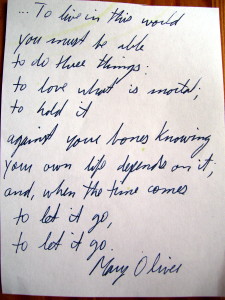Yesterday, we read Mark 7: 24-37 in church. It’s the difficult story of the Syrophoenician woman. Difficult because Jesus looks wrong.
I had the interesting experience of preaching at our first worship service, and then listening to someone else tackle the same passage at the second service. My take was that Jesus was wrong – and that it was a product of his total humanity. Born into human community, he experiences the limitations of being human, which includes being, at times, clueless about how to treat others. When the woman asked for help, he said the “right” things according to Jewish law and tradition. And then, just like the rest of us, needed to be confronted by his own blindness.
The second preacher took the line that Jesus knew what he was saying and said it to give the woman a chance to speak up, and to give the world a glimpse of the power of unlimited love.
It’s an opening experience to consider the story twice. It raised good questions for me about perspective and opinion. It made me wonder. And either way you read the passage, the story turns with the voice of a passionate mother. I love that.
This outsider woman sees that the kingdom goodness Jesus has been teaching can’t be contained, and she longs for it to overflow into her daughter’s life. So she gets courageous. She steps out of line. She talks back with the strongest of love. That’s powerful.
Scripture is shot through with stories of intercession and wrestling with God, but for me, this is one of the strongest. It’s only a tiny story, and often avoided because it’s embarrassing to read the confusing bit when Jesus says no. But this should be in every Sunday School curriculum, really. Think about it. This is a moment when God is confronted by passionate human love, and listens. And changes the world.
This is a significant lesson in how to live. Love deeply – so deeply that you’re bold, so passionately that you are ready to speak out. We teach kids to pray, and often it’s quiet and nice and calming. But this is also prayer. Being so full of love that you can debate with God.

Of course, it’s also a lesson in the nature of God. God, who is three in one and relational at the core of God’s being, invites us to speak out, too. Not just to echo what we’ve heard, but to speak our hopes, doubts, questions, and passionate convictions. To speak our love. We are not silenced. We are invited to stand up tall and intercede. That’s a gift of freedom. That’s grace.
I’ve been reading the poems of Mary Oliver lately. It’s her birthday today, so it’s a good time to share. She writes about love; maybe all poets do one way or another. I’ve been thinking about love and being a parent. About intercession, which sometimes is just whispered prayer over my sleeping children. Sometimes a hand on a curly head. And sometimes a headful of worry and a hundred questions for God about these growing children. There’s a lot of growth that becomes apparent in the fall. The summer is becoming a set of stories around here, and we’re turning towards new things. Suddenly, the kids look more capable. This weekend, we went for our first family bike ride on eight wheels. Wonderful. Terrifying. Mouths filled with assuring words and throats choked with prayers for safety. I guess that’s how it is. With growth come new ways of love.
Here’s an Oliver poem for these September days.
Wild Geese
You do not have to be good.
You do not have to walk on your knees
for a hundred miles through the desert repenting.
You only have to let the soft animal of your body
love what it loves.
Tell me about despair, yours, and I will tell you mine.
Meanwhile the world goes on.
Meanwhile the sun and the clear pebbles of the rain
are moving across the landscapes,
over the prairies and the deep trees,
the mountains and the rivers.
Meanwhile the wild geese, high in the clean blue air,
are heading home again.
Whoever you are, no matter how lonely,
the world offers itself to your imagination,
calls to you like the wild geese, harsh and exciting
over and over announcing your place
in the family of things.
from Dream Work by Mary Oliver
published by Atlantic Monthly Press



